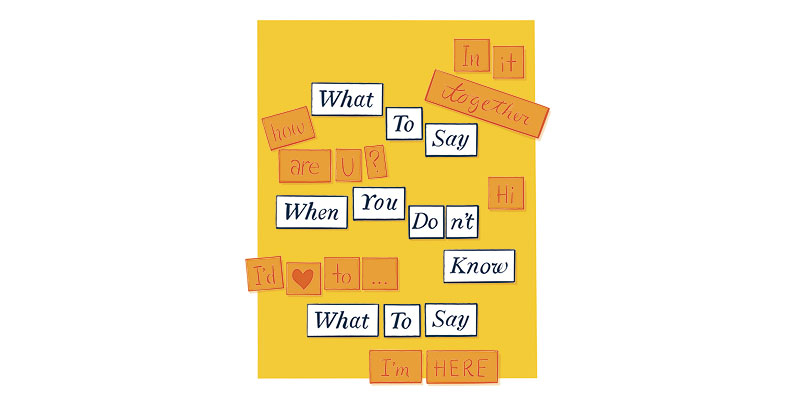What to say when you don't know what to say
by Anna Megdell

Illustration: Amanda Walden
Insight from Rogel patients on how to show up for loved ones authentically
When your family or friend has cancer, it can be hard to know how to offer support.
Even with the best intentions, finding the right tone or knowing what kind of help to offer can be tricky, especially when the stakes feel so high.
In a conversation with several Rogel patients, they report loved ones who were worried about saying the wrong thing or worse, who didn’t show up because they didn’t want to be a bother.
How can you best offer words and support to the person you care about? Here’s what our patients had to say (note: authenticity came up a lot).
> "For me, the hardest part was when people didn't know what to say and withdrew. They didn't want to upset me or say the wrong thing, and it was their way of trying to protect me. But I'd rather have someone try and say the wrong thing, or even just chat with me about simple things, than to say nothing at all."
> “Even admitting ‘I don't know what to say’ goes a long way.”
> “Phrases that resonated with me weresimple: I’m here. I see you. I’m thinking of you.”
> “Instead of saying ‘Let me know if you need anything,’ I really appreciated when friends and family offered ideas. For example, ‘I’d love to bring you a meal or take you to an appointment. When works best for you?’ Having them put effort into thinking of ways to support me that they could follow through on, and then letting me respond with what worked best for me made me feel like we were in this together.”
> “I wanted my family and friends to know I didn’t expect them to cure my cancer or somehow ‘fix’ my experience. I just wanted to feel like I wasn’t alone. Genuinely asking ‘How are you?’ and truly listening to my response went a long way.”
> “Support is multifaceted. I want people to show up in a way they’re comfortable with that’s authentic to them. If they want to sit and visit, great. If they want to drop a card on my porch and not have a face-to-face, that’s great too.”
> “I loved when people said, ‘I want to be there for you in whatever way you’re comfortable’ and then gave me some suggestions to work from.”
> “Consistency and frequency of contact are important to me. One friend checks in the day before I have chemo to remind me to take extra good care of myself.”
> “Tone matters. I appreciate when people are upbeat, gentle, compassionate and encouraging. It makes me feel like they ‘get’ it.”
> Anything that is too intrusive or that relies on assumption — Having cancer must be depressing. You look so healthy, I can’t believe you have cancer — wasn’t supportive. I’d prefer gentle curiosity or a genuine desire to listen.”
Visit the Support Services page for more information on coping with cancer
Continue reading Spring 2025 issue of Thrive. Or, download and print the issue.
